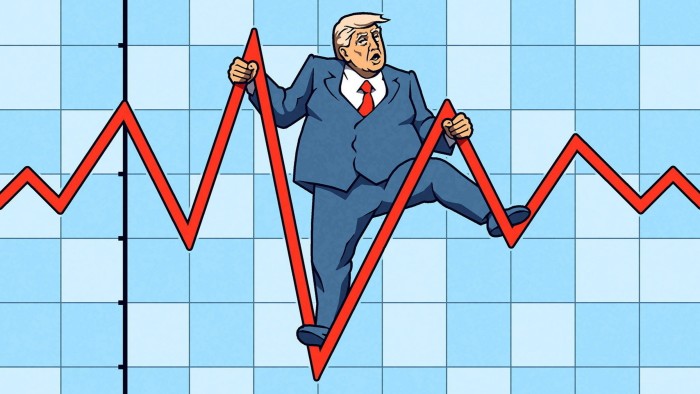Unlock the Editor’s Digest for free
Roula Khalaf, Editor of the FT, selects her favourite stories in this weekly newsletter.
It is a mark of how eager investors are to put the idea of a trade war behind them that markets surged last week on the news of a tariff “deal” between the US and China.
Never mind that it was a 90-day pause on higher rates that is likely to bring only temporary relief. Investors bought the story that US President Donald Trump’s market friendly Treasury secretary Scott Bessent was now firmly in the driving seat, China hawk Peter Navarro had been pushed into a broom cupboard somewhere in the back of the White House and we could all go back to pre-“liberation day” bullishness.
I don’t buy it.
I think we are still in for a lot more volatility — not only in the next three months as the new normal of 10 per cent across-the-board US tariffs shakes out (and this is the best-case scenario), but over the next few years, as the long-term structural trends towards a new global economic paradigm continue.
Let’s start with the immediate issues. While it is too early to see inflation in the data (the producer price index, a gauge of wholesale prices, fell slightly in April), there are numerous anecdotal warning signs about tariff-related price increases on the horizon.
Profit margins have been squeezed and even the largest retailers seem unwilling to take a greater hit. Walmart last week announced that it was raising prices on goods like electronics and toys because of Chinese tariff rates, and warned that there would be more price rises to come.
“Given the magnitude of the tariffs, even at the reduced rates . . . we aren’t able to absorb all the pressure,” said Doug McMillon, the retailer’s chief executive. If Walmart feels it has to raise prices, you can bet others will, too.
Jay Powell, chair of the US Federal Reserve, stressed in a speech last week that “higher real rates may . . . reflect the possibility that inflation could be more volatile going forward than in the inter-crisis period of the 2010s. We may be entering a period of more frequent, and potentially more persistent, supply shocks — a difficult challenge for the economy and for central banks.”
Stagflation is of course the big risk here. As TS Lombard managing director Steve Blitz wrote in a note last week to clients: “Even if a mild recession takes hold, a higher inflation outcome seems assured given the addition of tariffs to the trajectory of ever bigger budget deficits. Monetary policy alone cannot reverse the trend without the deficit shrinking.”
Indeed. America’s poor fiscal position is the elephant in the room. Even if you assume that the US can raise between $200bn and $250bn in revenue from tariffs, that doesn’t meaningfully offset a $1.8tn deficit.
Add to this the new budget bill before the House of Representatives, which would add $3.3tn to the debt over 10 years, and $5.2tn if you assume that all the gimmicky expirations are extended permanently, according to the Committee for a Responsible Federal Budget, a non-profit. A number of hardline Republicans rejected the first draft late last week, but negotiations are ongoing, and the end result is unlikely to help the US fiscal picture.
America’s debt issues are structural and long term, and they may trigger others. What happens if there’s a slowdown or a recession that causes tax receipts to decline precipitously even as interest rates remain elevated?
While inflation can temporarily ease the burden of debt, it could also make doing business in the US more expensive. As Blitz notes: “One can, in fact, imagine a scenario where the Fed helps the dollar strengthen to keep in check the real interest rates needed to sustain needed inflows and all that, in turn, overwhelms the tariffs as a barrier to keep firms from sourcing foreign capital and labour.”
Trump will undoubtedly try to put pressure on firms that outsource — witness his “little problem with Tim Cook” last week after Apple announced plans to source iPhones from India. But the rest of the world isn’t standing still.
China and many other countries have built up huge gold reserves in recent years, in expectation of decoupling and a move away from the dollar. And while gold prices fell somewhat after the market surge, I wouldn’t be surprised if there was another uptick at some point. Costco, the discount retailer, put new limits on gold bar sales last week, allowing customers to buy only one, rather than two, at a time, as it can’t keep up with demand.
One of the particularly tricky things about the current moment is that you can imagine both a supply and a demand shock happening at the same time. Tariffs may disrupt supply at the very time that a slowdown adversely affects demand.
The last time a combined supply and demand shock happened was during the first world war, according to Princeton economic historian Harold James, who gave a presentation on the topic recently at the Hoover Institution. Supply shocks tend to increase globalisation in their aftermath (which might support equity markets), while demand shocks do the opposite. When they come together, there’s no telling what can happen. Either way, James told me, such shocks “put a premium on government competence”.
The UK, with its “Liz Truss moment”, has already seen what can happen when that’s lacking. The US may yet too.
Read the full article here




